
Phyllanthus reticulatus
(MRP Inclusive of all taxes)
- Shipping ₹79 for entire order
- Dispatch in 7 days
- Country of origin: India

(MRP Inclusive of all taxes)
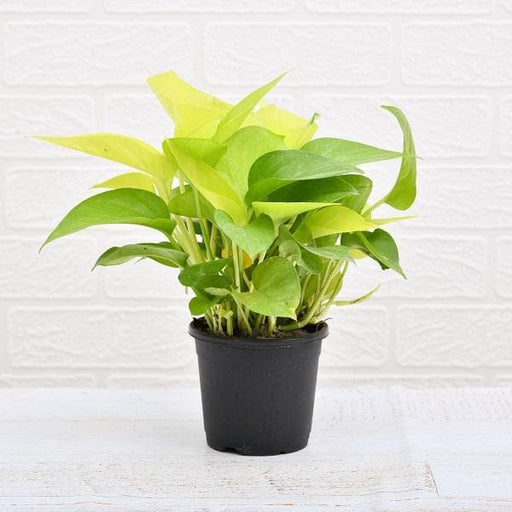 Save 29%
Save 29%
Air Purifier Money Plant with Pot The Air Purifier Money Plant, also known as Pothos or Epipremnum aureum, is a stunning indoor plant that...
View full details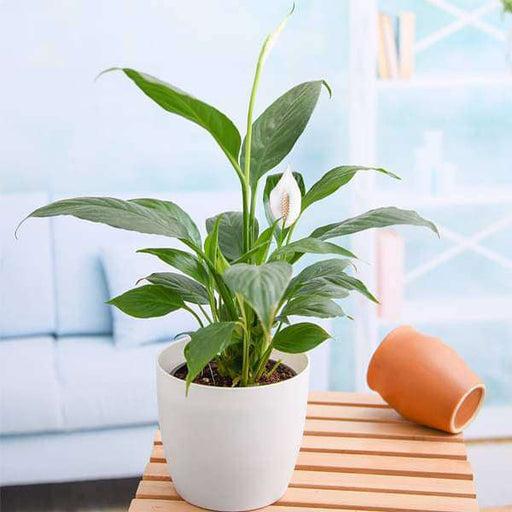
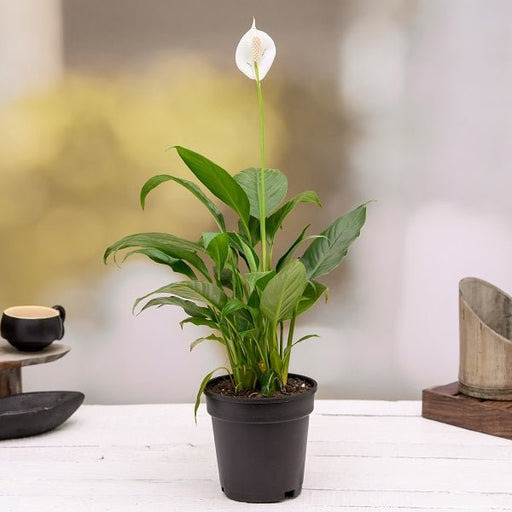 Save up to 15%
Save up to 15%
Peace Lily, Spathiphyllum - Plant The Peace Lily, scientifically known as Spathiphyllum, is a stunning houseplant celebrated for its elegant white...
View full details
 Save 25%
Save 25%
Jasminum sambac, Mogra, Arabian Jasmine - Plant Jasminum sambac, commonly known as Mogra or Arabian Jasmine, is a fragrant flowering plant...
View full details
 Save 18%
Save 18%
Combo Constituents Includes the Parijat Tree (Night-Flowering Jasmine), a culturally significant plant with fragrant flowers. Description The Pari...
View full details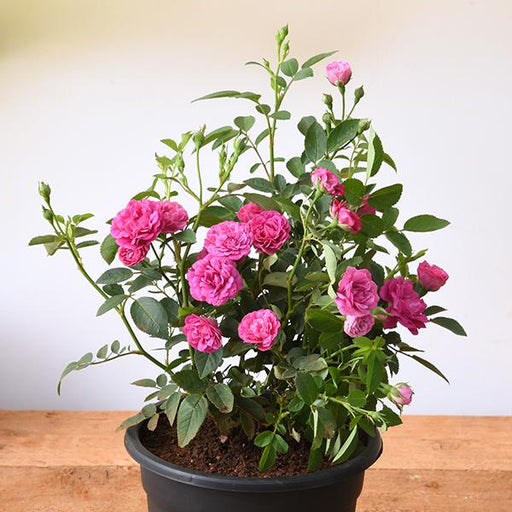
 Save 25%
Save 25%
Miniature Rose, Button Rose (Any Color) - Plant The Miniature Rose, also known as the Button Rose, is a charming and compact flowering plant that ...
View full details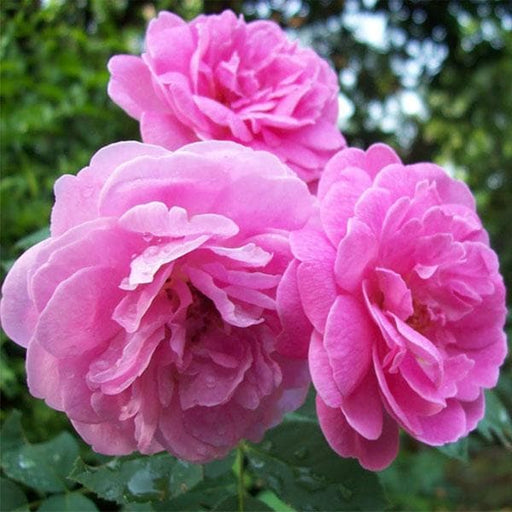 Save 25%
Save 25%
Damascus Rose, Scented Rose (Any Color) - Plant The Damascus Rose, also known as Rosa damascena, is a timeless symbol of beauty and romanc...
View full details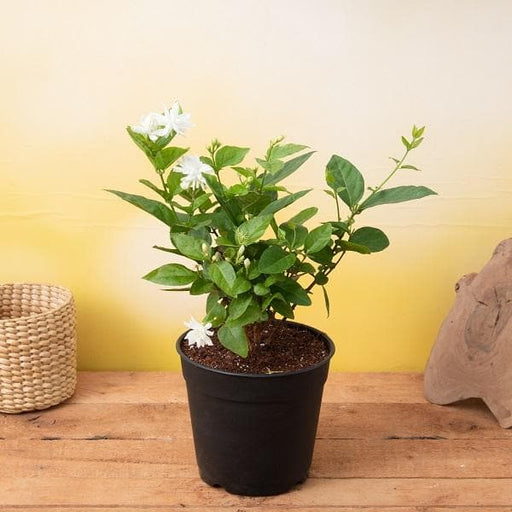
 Save 17%
Save 17%
Beautiful Fragrant Mogra, Arabian Jasmine Plant with Pot The Beautiful Fragrant Mogra, also known as Arabian Jasmine (Jasminum sambac), is...
View full details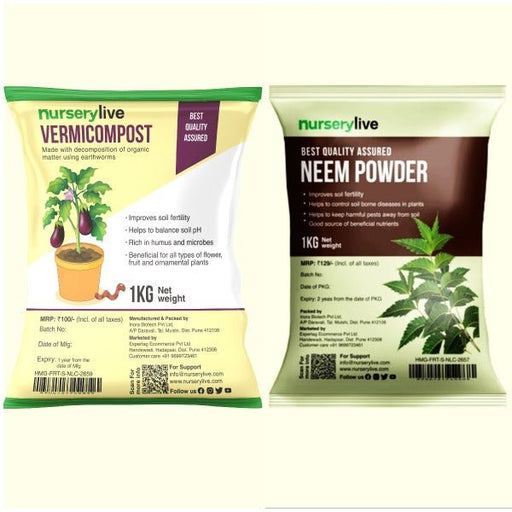 Save 15%
Save 15%
Pack of Vermicompost and Neem Cake for House Plants Transform your indoor garden with our premium Pack of Vermicompost and Neem Cake, spec...
View full details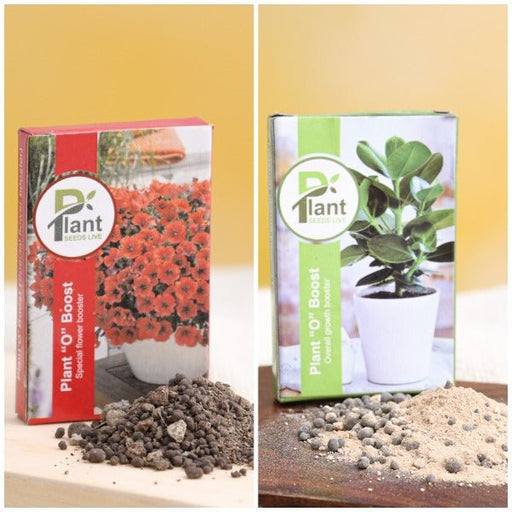
Pack of Plant Growth and Flower Boosters Unlock the full potential of your garden with our Pack of Plant Growth and Flower Boosters! This ...
View full details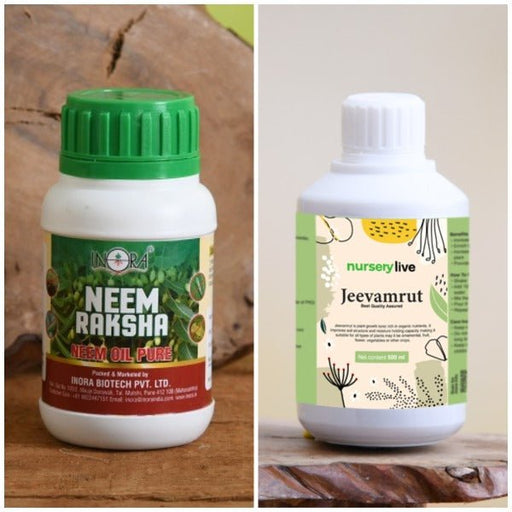 Save 38%
Save 38%
Combo of Jeevamrut and Neem Raksha for Easy Growth and Protection of Houseplants Transform your indoor garden with our exclusive combo of ...
View full details Save 22%
Save 22%
Plant Nutrients Kit (Pack of 16) for a Healthy Garden Transform your garden into a lush paradise with our Plant Nutrients Kit, featuring 1...
View full details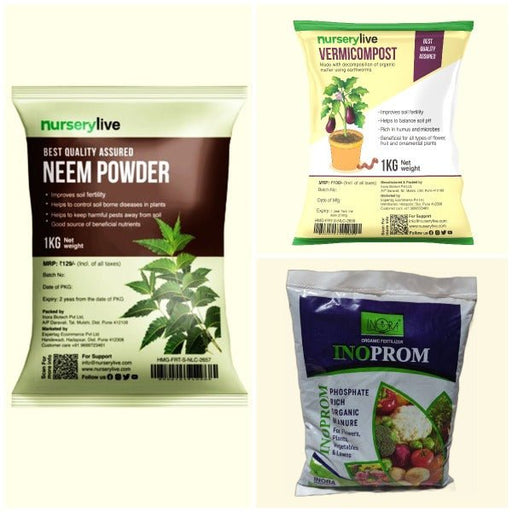 Save 16%
Save 16%
Combo of Top Plant Fertilizers Elevate your gardening game with our exclusive Combo of Top Plant Fertilizers, featuring two bags of premiu...
View full details Save 24%
Save 24%
Pack of 4 Additives to Make Soil Healthy and Nutrient Rich Transform your garden into a thriving ecosystem with our Pack of 4 Additives de...
View full details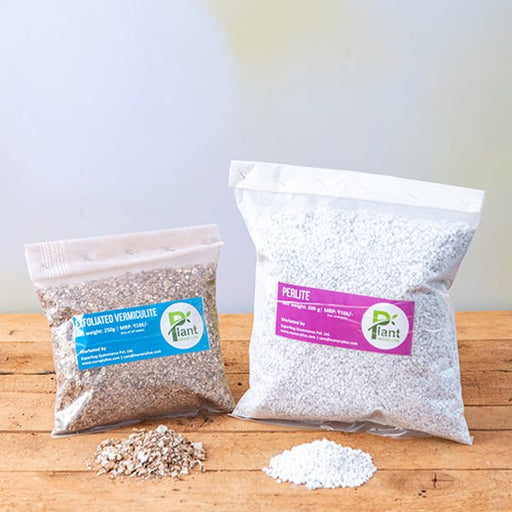 Save 30%
Save 30%
Transform your gardening experience with our premium Combo of Perlite and Vermiculite. This unique blend is designed to enhance soil aeration and ...
View full details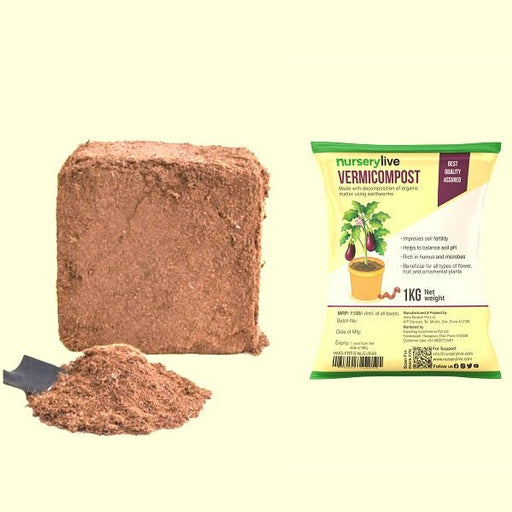 Save 27%
Save 27%
Combo of 2 Vermicompost and Cocopeat - Enrich Your Soil Naturally! Transform your garden into a thriving ecosystem with our Combo of 2 Ver...
View full details
 Save 35%
Save 35%
Best 6 Plants for Perfect Indoor Garden Transform your living space into a lush oasis with our curated collection of the Best 6 Plants for a...
View full details
 Save up to 50%
Save up to 50%
Mini Succulent Garden Pack Transform your space with our Mini Succulent Garden Pack, featuring a delightful collection of 4 any variety beautiful s...
View full details
 Save 30%
Save 30%
5 Best Fragrant Plants Transform your garden or indoor space into a fragrant paradise with our curated selection of the 5 Best Fragrant Plants. Th...
View full details
 Save 24%
Save 24%
Set of 2 Bonsai Looking Grafted Adeniums Transform your indoor or outdoor space with our exquisite Set of 2 Bonsai Looking Grafted Adenium...
View full details Save 45%
Save 45%
Top 4 Die Hard Succulents Pack Transform your indoor or outdoor space with our Top 4 Die Hard Succulents Pack, featuring a curated selecti...
View full details
 Save 30%
Save 30%
5 Best Indoor Plants Pack Transform your living space into a lush oasis with our '5 Best Indoor Plants Pack.' This carefully curated collection fe...
View full details
 Save 25%
Save 25%
Set of 4 Evergreen Air Purifier Plant Pack Transform your indoor space into a lush, green oasis with our Set of 4 Evergreen Air Purifier Pla...
View full details| SrNo | Item Name |
|---|---|
| 1 | Phyllanthus reticulatus |
Phyllanthus reticulatus, commonly known as the 'Net Leaf' or 'Stonebreaker', is a perennial herbaceous plant native to tropical regions. This remarkable species is characterized by its unique net-like leaf structure and small, yellow-green flowers. Traditionally used in herbal medicine, it has gained popularity for its potential health benefits, including liver support and kidney stone prevention.
What makes Phyllanthus reticulatus special is its rich history in traditional medicine, particularly in Ayurvedic practices. It is revered for its ability to detoxify the body and promote overall wellness. The plant thrives in various environments, making it a versatile addition to any garden or herbal collection.
One of the standout features of Phyllanthus reticulatus is its resilience. This hardy plant can adapt to different soil types and conditions, making it an excellent choice for both novice and experienced gardeners. Its vibrant foliage and unique appearance also add aesthetic value to any landscape.
This tree isn’t just a pretty face in the botanical world; it’s a powerhouse of health benefits! Known for its medicinal properties, Phyllanthus reticulatus is like that friend who always has a remedy for your woes. From liver health to anti-inflammatory effects, this tree has been used in traditional medicine for centuries. It’s like nature’s little pharmacy, offering a plethora of phytochemicals that can help you feel your best. So, if you’re looking to add a touch of green to your life and some wellness to your routine, this tree might just be your new best friend.
a tropical paradise where the sun shines bright, and the air is filled with the sweet scent of nature. That’s the ideal habitat for Phyllanthus reticulatus! Thriving in warm, humid climates, this tree loves to show off its vibrant green leaves in places like Southeast Asia and Africa. It’s like the life of the party, soaking up the sun and making friends with other flora. If you’re planning a trip to these regions, keep an eye out for this botanical superstar, as it’s always ready to steal the show with its lush presence.
Growing Phyllanthus reticulatus is like hosting a garden party where everyone is invited! This tree is relatively easy to cultivate, making it a favorite among green thumbs and novice gardeners alike. With a little sunshine, well-drained soil, and some TLC, you’ll have a thriving tree in no time. It’s like planting a little piece of tropical paradise right in your backyard. Just remember, this tree loves to stretch its limbs, so give it some space to grow and flourish. Before you know it, you’ll be the proud owner of a stunning Phyllanthus reticulatus!
If versatility were a tree, it would be Phyllanthus reticulatus! This botanical wonder is not just a pretty sight; it’s a jack-of-all-trades. From traditional medicine to landscaping, its uses are as diverse as a buffet spread. The leaves can be brewed into teas, while the wood can be used for crafting. It’s like the Swiss Army knife of the plant world, ready to tackle whatever you throw its way. So, whether you’re looking to sip on some herbal goodness or spruce up your garden, this tree has got you covered!
Spotting Phyllanthus reticulatus is like playing a game of botanical hide-and-seek! With its distinctive features, you’ll soon become a pro at identifying this tree. Look for its alternate, ovate leaves that are a vibrant green, and don’t forget to check out its unique, small flowers that bloom in clusters. The bark is another giveaway, often appearing grayish-brown and slightly rough. Once you’ve got the hang of it, you’ll be impressing your friends with your newfound plant identification skills. Who knew botany could be so much fun?
Want to spread the love of Phyllanthus reticulatus? Propagation is the way to go! This tree is like that friend who’s always ready to share their snacks; it’s generous with its cuttings and seeds. You can easily propagate it through seeds or stem cuttings, making it a delightful project for any gardening enthusiast. Just ensure you provide the right conditions—warmth, moisture, and a little patience—and watch as your new trees take root. Before you know it, you’ll have a mini forest of Phyllanthus reticulatus to admire!
Every tree has its foes, and Phyllanthus reticulatus is no exception. While this tree is generally resilient, it can attract a few pesky pests that think they’ve found a buffet. Aphids and scale insects are the usual suspects, but fear not! With a little vigilance and some natural pest control methods, you can keep these intruders at bay. Think of it as a game of defense; you’re the guardian of your green kingdom, and with the right strategies, you can ensure your Phyllanthus reticulatus remains healthy and thriving.
In the world of Ayurveda, Phyllanthus reticulatus is like the wise sage who knows all the secrets to wellness. Revered for its healing properties, this tree is often used to balance the doshas and promote overall health. From detoxifying the liver to supporting digestive health, it’s a go-to ingredient in many herbal formulations. If you’re looking to embrace holistic health, incorporating this tree into your routine might just be the ticket. It’s like having a personal wellness coach right in your garden!
Step aside, modern medicine; Phyllanthus reticulatus has been a staple in traditional medicine for ages! Cultures around the world have harnessed its healing powers, using it to treat everything from fevers to digestive issues. It’s like the ancient wisdom of herbal remedies wrapped up in a leafy package. If you’re curious about natural healing, this tree is a fantastic starting point. Just remember, while it’s great for exploring traditional remedies, always consult with a healthcare professional before diving in!
Looking to add a touch of tropical flair to your landscape? Phyllanthus reticulatus is here to save the day! With its lush foliage and striking appearance, this tree can transform any garden into a vibrant oasis. It’s like the cherry on top of your landscaping sundae, providing shade and beauty all in one. Whether you’re designing a tropical-themed garden or just want to enhance your outdoor space, this tree is a fantastic choice. Get ready to impress your neighbors with your botanical brilliance!
In the face of climate change, Phyllanthus reticulatus stands tall like a resilient warrior! This tree is not just a pretty sight; it plays a role in combating environmental challenges. Its ability to thrive in various conditions makes it a valuable asset in reforestation efforts and soil stabilization. By planting this tree, you’re not just beautifying your space; you’re contributing to a greener planet. So, let’s give a round of applause to Phyllanthus reticulatus for being a champion of sustainability!
Phyllanthus reticulatus, also known as the "leafy wonder," is a tropical plant celebrated for its medicinal properties. This perennial shrub boasts small, green leaves and tiny flowers, making it a favorite among herbal enthusiasts. It’s like nature’s little pharmacy, ready to tackle various ailments while looking fabulous in your garden.
This plant thrives in tropical and subtropical regions, strutting its stuff in places like India, Africa, and Southeast Asia. It loves warm weather and well-drained soil, making it the diva of the plant world. If you’re in a cooler climate, you might need to bring this beauty indoors for a cozy winter.
Phyllanthus reticulatus is a multitasker in the herbal world! It’s often used to support liver health, manage diabetes, and even tackle kidney stones. Think of it as your health sidekick, ready to swoop in and save the day with its natural goodness. Just remember, it’s not a substitute for professional medical advice!
Your health deserves a personalized approach!
Using Phyllanthus reticulatus is as easy as pie! You can brew it into a tea, toss it into smoothies, or even use it in topical applications. Just remember to start small and see how your body reacts. It’s like dating; you want to take it slow before committing!
Absolutely! Phyllanthus reticulatus can be a charming indoor companion. Just give it plenty of sunlight, a pot with good drainage, and a sprinkle of love. It’s like having a little piece of the tropics right in your living room, minus the humidity and mosquitoes!
While this plant is generally well-tolerated, some folks might experience mild digestive upset or allergic reactions. It’s like that friend who sometimes overstays their welcome—best to keep an eye on how your body responds. If things get dicey, it’s time to call it quits!
Phyllanthus reticulatus stands out with its unique blend of benefits, especially for liver and kidney health. While other herbs may focus on specific issues, this one is like the Swiss Army knife of the herbal world. Versatile, effective, and always ready to lend a hand!
Yes, indeed! Phyllanthus reticulatus has been traditionally used to support liver function and detoxification. It’s like a gentle cleanse for your liver, helping it do its job without the harsh side effects of some detox diets. Your liver will thank you for this herbal hug!
You can find Phyllanthus reticulatus at local herbal shops, online retailers, or even in your neighbor’s garden if they’re feeling generous. Just make sure you’re sourcing it from reputable suppliers to ensure quality. After all, you want the crème de la crème of herbal goodness!
Absolutely! Growing Phyllanthus reticulatus from seeds is like starting a new adventure. Just plant them in well-drained soil, keep them warm, and watch them sprout. It’s a rewarding experience that’ll have you feeling like a proud plant parent in no time!